 W
W334 is a science fiction novel by American author Thomas M. Disch, written in 1972. It is a dystopian look at everyday life in New York City around the year 2025. The dust cover design for the first edition was by Michael Hasted.
 W
WAnnihilation Factor is the second science fiction novel by Barrington J. Bayley, expanded from a 1964 short story originally published in New Worlds. It centres on the strains placed on a galactic empire by the appearance of the mysterious, planet-devouring "patch".
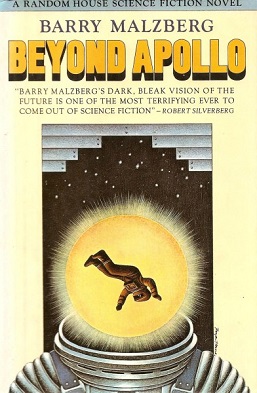 W
WBeyond Apollo is a science fiction novel by American writer Barry N. Malzberg, first published in 1972 in a hardcover edition by Random House. Malzberg credits the inspiration for the novel to "I Have My Vigil", a 1969 short story by fellow science fiction writer Harry Harrison.
 W
WBlack Legion of Callisto is a science fantasy novel by American writer Lin Carter, the second in his Callisto series. It was first published in paperback by Dell Books in December 1972, and reprinted twice through January 1974. The first British edition was published by Orbit Books in 1975. It was later gathered together with Jandar of Callisto into the omnibus collection Callisto: Volume 1 (2000). The book includes an appendix collating background information from this and the previous volume.
 W
WThe Book of Skulls is a science fiction novel by Robert Silverberg, which was first published in 1972. It was nominated for the Nebula Award in 1972, and both the Hugo and Locus Awards in 1973.
 W
WBreakfast in the Ruins: A Novel of Inhumanity is a 1972 novel by Michael Moorcock, which mixes historical and speculative fiction. It was first published in the United Kingdom by the New English Library. The novel centres on Karl Glogauer, who is also the protagonist of Moorcock's Nebula Award winning novella, Behold the Man, his homosexual exploits with an unnamed man from Nigeria, and his fantasies of the past and lives that he could have led.
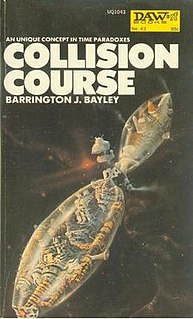 W
WCollision Course is the fourth novel by the science fiction author Barrington J. Bayley. The novel was inspired by the multiple time dimensions proposed by J. W. Dunne. The plot centers on the collision of two alternate "presents", with disastrous implications for reality.
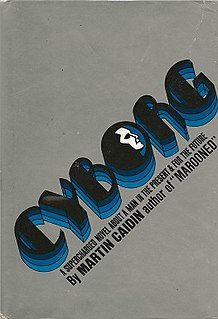 W
WCyborg is the title of a science fiction/secret agent novel, written by Martin Caidin, which was first published in 1972. The novel also included elements of speculative fiction, and was adapted as the television movie The Six Million Dollar Man, which was followed by a weekly series of the same title, both of which starred Lee Majors, and also inspired a spin-off, The Bionic Woman.
 W
WDying Inside is a science fiction novel by American writer Robert Silverberg. It was nominated for the Nebula Award in 1972, and both the Hugo and Locus Awards in 1973.
 W
WEmpire of Two Worlds is the third science fiction novel by Barrington J. Bayley. The main characters are "tankless" inhabitants of a dim and dry colony world who attempt to find a lost gateway back to Earth.
 W
WThe English Assassin: A Romance of Entropy is a 1972 novel by British fantasy and science fiction writer Michael Moorcock, first published in the UK by Allison & Busby and in the US by Harper & Row. Subtitled "A romance of entropy" it was the third part of his long-running Jerry Cornelius series.
 W
WThe Fifth Head of Cerberus is the title of both a novella and a single-volume collection of three novellas, written by American science fiction and fantasy author Gene Wolfe, both published in 1972. The novella was included in the anthology Nebula Award Stories Eight.
 W
WFugue for a Darkening Island is a dystopian novel by Christopher Priest. First published in 1972, it deals with a man's struggle to protect his family and himself in a near future England ravaged by civil war. It is brought about by the rise of a new, third party who enter government and combat a massive influx of African refugees, which have been allied in part by the principle opposition faction known as the secessionists, culminating into a multiple party conflict.
 W
WThe Gods Themselves is a 1972 science fiction novel written by Isaac Asimov. It won the Nebula Award for Best Novel in 1972, and the Hugo Award for Best Novel in 1973.
 W
WThe Iron Dream is a metafictional 1972 alternate history novel by American author Norman Spinrad. The book has a nested narrative that tells a story within a story. On the surface, the novel presents a post-apocalyptic adventure tale entitled Lord of the Swastika, written by an alternate-history Adolf Hitler shortly before his death in 1953. In this timeline, Hitler emigrated from Germany to the United States in 1919 after the Great War, and used his modest artistic skills to become first a pulp–science fiction illustrator and later a successful writer, telling lurid, purple-prosed, pro-fascism stories under a thin science fiction veneer. The nested narrative is followed by a faux scholarly analysis by a fictional literary critic Homer Whipple which is said to have been written in 1959.
 W
WJandar of Callisto is a science fantasy novel by American writer Lin Carter, the first in his Callisto series. It was first published in paperback by Dell Books in December 1972, and reprinted twice through September 1977. The first British edition was published by Orbit Books in 1974. It was later gathered together with Black Legion of Callisto into the omnibus collection Callisto: Volume 1 (2000). The book includes a map of Callisto as envisioned in the story.
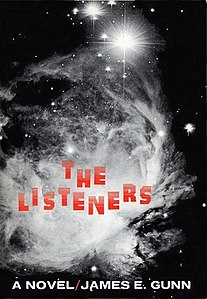 W
WThe Listeners is a 1972 science fiction novel by American author James Gunn. It centers on the search for interstellar communication and the effect that receipt of a message has. Although the search and the message are the unifying background of the novel, the chapters explore the personal effect of these events have on the lives of the characters.
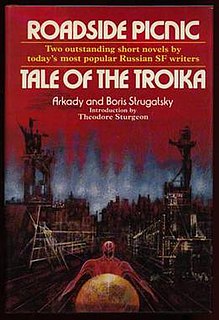 W
WRoadside Picnic is a science fiction novel by Soviet-Russian authors Arkady and Boris Strugatsky, written in 1971 and published in 1972. It is the brothers' most popular and most widely translated novel outside the former Soviet Union. As of 2003, Boris Strugatsky has counted 55 publications of "Picnic" in 22 countries.
 W
WThe Second Trip is a 1972 science fiction novel by American writer Robert Silverberg. Prior to its publication by Doubleday, it was published in serialized form in Amazing Stories from July to September 1971.
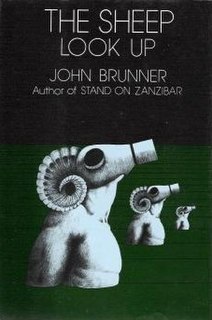 W
WThe Sheep Look Up is a science fiction novel by British author John Brunner, first published in 1972. The novel's setting is decidedly dystopian; the book deals with the deterioration of the environment in the United States. It was nominated for the Nebula Award for Best Novel in 1972 and is celebrated in a 1988 essay by John Skipp in Horror: 100 Best Books. The novel is the third of Brunner's "Club of Rome Quartet", each dealing with a separate social issue with Sheep being about pollution, coming after 1968's Stand on Zanzibar which is about overpopulation, 1969's The Jagged Orbit which is about violence, and coming before 1975's Shockwave Rider which is about computers.
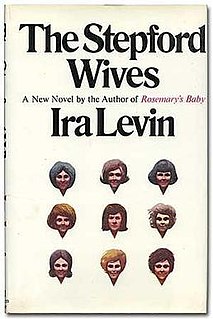 W
WThe Stepford Wives is a 1972 satirical novel by Ira Levin. The story concerns Joanna Eberhart, a photographer and young mother who suspects the submissive housewives in her new idyllic Connecticut neighborhood may be robots created by their husbands.
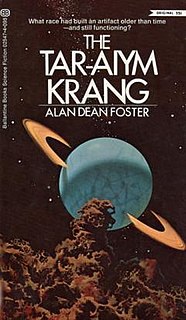 W
WThe Tar-Aiym Krang (1972) is a science fiction novel by American writer Alan Dean Foster. It is Foster’s first published novel and started both his Humanx Commonwealth universe and his two most popular recurring characters, Pip and Philip Lynx ("Flinx"). The book is second chronologically in the Pip and Flinx series.
 W
WThe Terminal Man is a novel by American writer Michael Crichton. It is his second novel under his own name and his twelfth overall, and is about the dangers of mind control. It was published in April 1972, and also serialized in Playboy in March, April, and May 1972. In 1974, it was made into a film of the same name.
 W
WTransit to Scorpio is a science fiction novel by British writer Kenneth Bulmer, written under the pseudonym of Alan Burt Akers. It is the first book in his Dray Prescot series of sword and planet novels, set on the fictional world of Kregen, a planet of the Antares star system in the constellation of Scorpio. It was first published by DAW Books in 1972.
 W
WTunnel Through the Deeps is a 1972 alternate history/science fiction novel by American writer Harry Harrison. It was serialized in Analog magazine beginning in the April 1972 issue.
 W
WUnder the Green Star is a science fantasy novel by American writer Lin Carter. Published by DAW Books in 1972, it is the first novel in his Green Star Series.
 W
WWe Can Build You is a 1972 science fiction novel by American writer Philip K. Dick. Written in 1962 as The First in Our Family, it remained unpublished until appearing in serial form as A. Lincoln, Simulacrum in the November 1969 and January 1970 issues of Amazing Stories magazine, re-titled by editor Ted White. The novel was issued as a mass market paperback original by DAW Books in 1972, its final title provided by publisher Donald A. Wollheim. Its first hardcover edition was published in Italy in 1976, and Vintage issued a trade paperback in 1994.
 W
WWhen HARLIE Was One is a 1972 science fiction novel by American writer David Gerrold. It was nominated for the Nebula Award for Best Novel in 1972 and the Hugo Award for Best Novel in 1973. The novel, a "fix-up" of previously published short stories, was published as an original paperback by Ballantine Books in 1972, with an accompanying Science Fiction Book Club release. A revised version, subtitled "Release 2.0", was published in 1988 by Bantam Books.